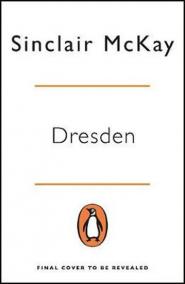Dresden
Dátum vydania: 03.09.2020
In February 1945 the Allies obliterated Dresden, the 'Florence of the Elbe'. Explosive bombs weighing over 1,000 lbs fell every seven and a half seconds and an estimated 25,000 people were killed. Was Dresden a legitimate military target or was the bombing a last act of atavistic mass murder in a war already won?
From the history of the city to the attack itself ...
Naša cena knihy: 21,95 €
Zasielame: Vypredané
Detaily o knihe
Počet strán: 400
Rozmer: 128x197x30 mm
Hmotnosť: 320 g
Jazyk: Anglicky
EAN: 9780241986011
Rok vydania: 2020
Žáner: Angličtina ( tituly v Anglickom jazyku)
Typ: Paperback
Zákazníci, ktorí si kúpili túto knihu, si kúpili aj...
O knihe
In February 1945 the Allies obliterated Dresden, the 'Florence of the Elbe'. Explosive bombs weighing over 1,000 lbs fell every seven and a half seconds and an estimated 25,000 people were killed. Was Dresden a legitimate military target or was the bombing a last act of atavistic mass murder in a war already won?
From the history of the city to the attack itself, conveyed in a minute-by-minute account from the first of the flares to the flames reaching almost a mile high - the wind so searingly hot that the lungs of those in its path were instantly scorched - through the eerie period of reconstruction, bestselling author Sinclair McKay creates a vast canvas and brings it alive with touching human detail.
Along the way we encounter, among many others across the city, a Jewish woman who thought the English bombs had been sent from heaven, novelist Kurt Vonnegut who wrote that the smouldering landscape was like walking on the surface of the moon, and 15-year-old Winfried Bielss, who, having spent the evening ushering refugees, wanted to get home to his stamp collection. He was not to know that there was not enough time.
Impeccably researched and deeply moving, McKay uses never-before-seen sources to relate the untold stories of civilians and vividly conveys the texture of contemporary life. Dresden is invoked as a byword for the illimitable cruelties of war, but with the distance of time, it is now possible to approach this subject with a much clearer gaze, and with a keener interest in the sorts of lives that ordinary people lived and lost, or tried to rebuild.
Writing with warmth and colour about morality in war, the instinct for survival, the gravity of mass destruction and the manipulation of memory, this is a master historian at work.













